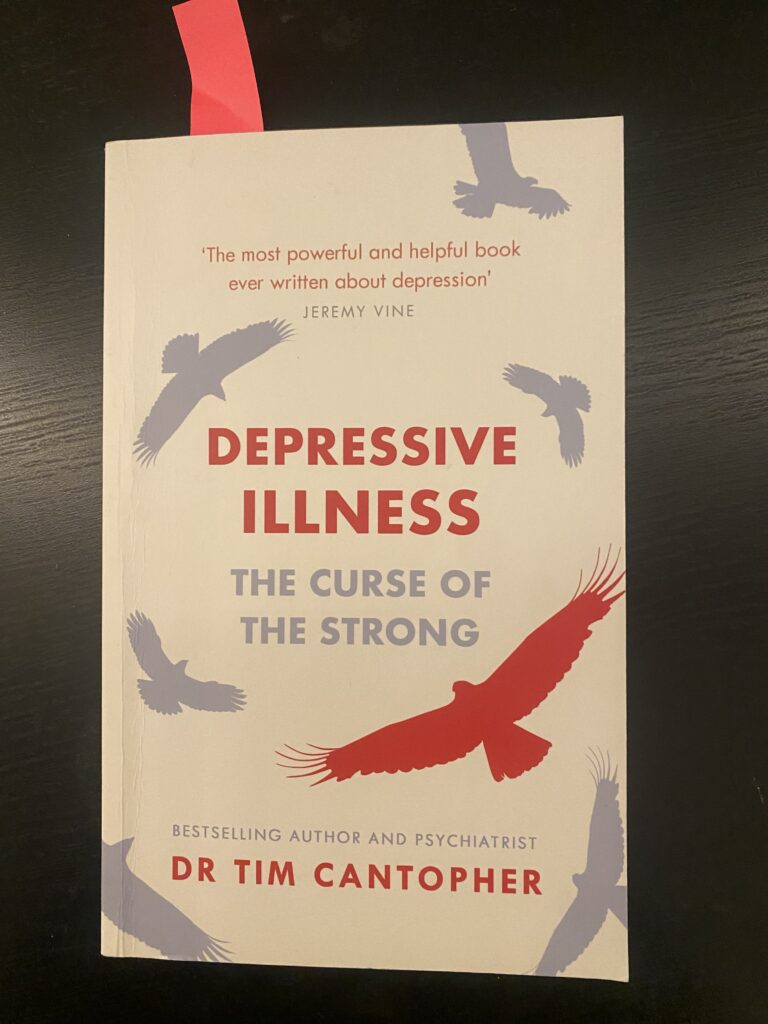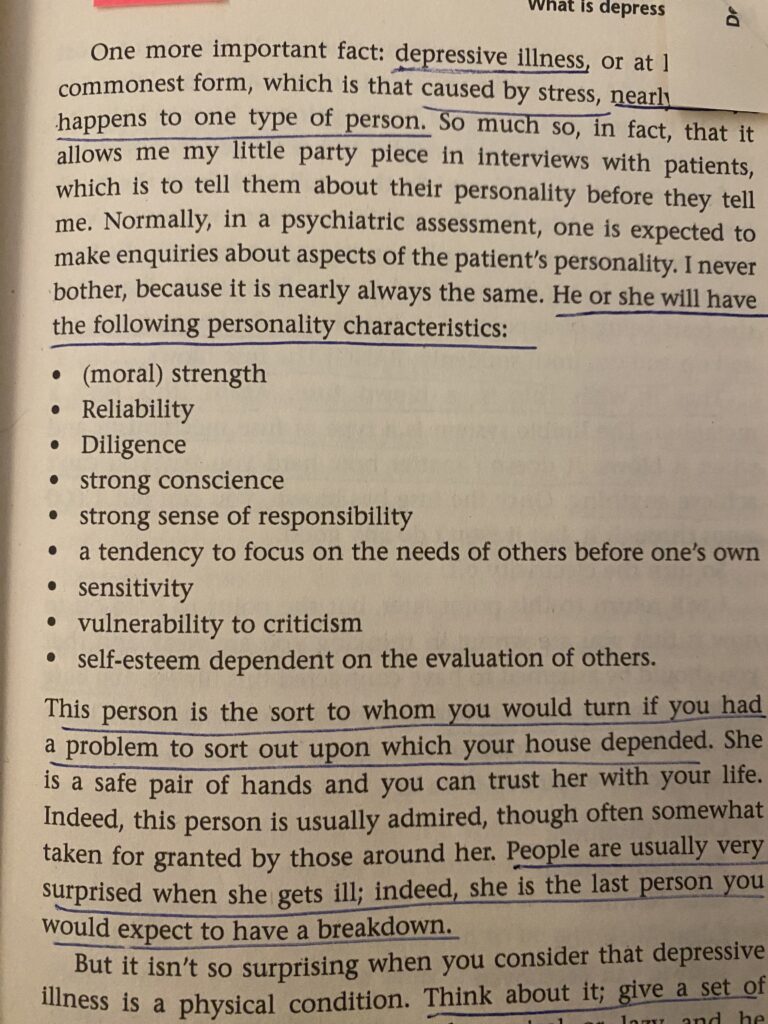
In the world we live in, burnout and depression are often perceived as signs of weakness or sensitivity. However, the reality is quite the opposite. In my personal journey through two burnouts, I discovered that the strength it takes to endure such challenges is immense, and the stigma surrounding mental health needs to be debunked.
My second burnout was an even more formidable battle than the first, prompting me to delve deep into understanding why it happened not once but twice. The turning point came when I stumbled upon the book “Depressive Illness – The Curse of the Strong” by psychiatrist Tim Cantopher. This insightful read shed light on the misconception that mental health struggles indicate weakness and sensitivity.

Cantopher outlines nine characteristics common among individuals grappling with mental health issues, and as I read through them, it felt like he was describing me. These traits, which I had perceived as virtues because they were valued by patients, were, in fact, contributing to my burnout. Let’s unravel these nine characteristics:
-
High Responsibility: Often seen as reliable, those prone to burnout carry a heavy burden of responsibility, sometimes beyond what is healthy.
-
Perfectionism: Striving for excellence can lead to burnout when the pursuit of perfection becomes relentless and unattainable.
-
Highly Conscientious: While being conscientious is admirable, excessive conscientiousness can lead to a constant state of stress.
-
Highly Sensitive: Sensitivity, though valuable, can make individuals more susceptible to the pressures of their environment.
-
Excessive Emotional Commitment: Investing too much emotionally, especially in a demanding profession, can deplete one’s mental resources.
-
Denial of Vulnerability: The belief in invincibility and an unwillingness to acknowledge vulnerability can contribute to burnout.
-
Inability to Delegate: Reluctance to delegate tasks can lead to an overwhelming workload and increased stress.
-
Compulsion to Achieve: The constant need to achieve, while driving success, can also be a breeding ground for burnout.
-
Lack of a Support System: Isolation and lack of a robust support system can intensify the impact of burnout.

Cantopher emphasizes that without a change in mindset, workplace, or life situation, repeated burnouts can occur, each more challenging than the last. Continual burnout can even lead to chronic illness.
Understanding that these traits, often seen as positive, can contribute to burnout is the first step toward breaking free from the stigma associated with mental health issues. It’s crucial to recognize the strength it takes to confront and overcome these challenges, and that seeking help is a sign of resilience, not weakness. Let’s collectively debunk the myths surrounding burnout and champion a culture that prioritizes mental well-being.

I am here if you need to talk and need support.
https://calendly.com/christinaradics/session
I wish you a wonderful Sunday and start of the week 🦋 Take care!
Christina




I can not thank you enough for what you do, Christina.
You’re a great inspiration! Keep up the will to help others, you will keep shining bright bright and bringing light to others so we all shine brighter together 🙌🏻
Omg 🥰 that what so beautifully said 🙏🏼 thank you so much for your love ❤️ and support 🦋😘
This website, you can find lots of casino slots from leading developers.
Players can experience retro-style games as well as feature-packed games with high-quality visuals and bonus rounds.
If you’re just starting out or a seasoned gamer, there’s a game that fits your style.
money casino
The games are ready to play anytime and designed for PCs and mobile devices alike.
You don’t need to install anything, so you can jump into the action right away.
Platform layout is intuitive, making it convenient to find your favorite slot.
Sign up today, and enjoy the excitement of spinning reels!
This section features multifunctional timepieces crafted by top providers.
Browse through sleek CD units with digital radio and dual alarms.
Each clock come with AUX jacks, USB charging, and memory backup.
This collection covers budget-friendly options to high-end designs.
cd alarm clock radio
Each one boast nap modes, night modes, and bright LED displays.
Buy now via direct eBay and no extra cost.
Choose the best disc player alarm clock for office daily routines.
This website, you can discover a great variety of slot machines from famous studios.
Users can enjoy retro-style games as well as modern video slots with stunning graphics and bonus rounds.
Even if you’re new or an experienced player, there’s always a slot to match your mood.
play casino
All slot machines are instantly accessible 24/7 and designed for PCs and smartphones alike.
No download is required, so you can get started without hassle.
The interface is easy to use, making it quick to find your favorite slot.
Join the fun, and enjoy the excitement of spinning reels!
Наличие страхового полиса перед поездкой за рубеж — это разумное решение для обеспечения безопасности отдыхающего.
Страховка гарантирует медицинские услуги в случае несчастного случая за границей.
К тому же, документ может предусматривать возмещение затрат на возвращение домой.
мед страховка для поездки за границу
Определённые государства предусматривают предоставление документа для пересечения границы.
При отсутствии полиса медицинские расходы могут стать дорогими.
Оформление полиса до поездки
Предстоящее лето обещает быть непредсказуемым и инновационным в плане моды.
В тренде будут асимметрия и яркие акценты.
Модные цвета включают в себя природные тона, создающие настроение.
Особое внимание дизайнеры уделяют тканям, среди которых популярны винтажные очки.
https://payhip.com/MaxBezel/blog/news/luchshie-letnie-luki-s-cvetochnym-platem-sovety-stilistov-lepodium
Снова популярны элементы нулевых, интерпретированные по-новому.
В стритстайле уже можно увидеть трендовые образы, которые вдохновляют.
Экспериментируйте со стилем, чтобы вписаться в тренды.
Mechanical watches will consistently be timeless.
They embody tradition and offer a level of detail that modern gadgets simply don’t replicate.
These watches is powered by tiny components, making it both useful and artistic.
Timepiece lovers cherish the manual winding.
https://metamoda.ru/moda/816-novyy-rekital-12-ot-bovet-kasabelnyy-brasletnyy-chasy/
Wearing a mechanical watch is not just about practicality, but about expressing identity.
Their designs are classic, often passed from one owner to another.
Ultimately, mechanical watches will forever hold their place.
This platform lets you get in touch with specialists for occasional hazardous tasks.
Visitors are able to quickly set up services for specific situations.
Each professional are qualified in handling complex jobs.
rent a hitman
Our platform ensures safe interactions between employers and workers.
When you need urgent assistance, this platform is ready to help.
Post your request and find a fit with the right person instantly!
Il nostro servizio offre l’ingaggio di lavoratori per incarichi rischiosi.
Gli interessati possono trovare esperti affidabili per lavori una tantum.
Tutti i lavoratori vengono scelti con severi controlli.
ordina l’uccisione
Con il nostro aiuto è possibile visualizzare profili prima di procedere.
La professionalità continua a essere al centro del nostro servizio.
Esplorate le offerte oggi stesso per ottenere aiuto specializzato!
Эта страница — официальный цифровой магазин Боттега Венета с отгрузкой по всей России.
В нашем магазине вы можете приобрести эксклюзивные вещи Bottega Veneta официально.
Каждая покупка подтверждаются оригинальными документами от производителя.
bottega-official.ru
Доставление осуществляется без задержек в по всей территории России.
Интернет-магазин предлагает разные варианты платежей и комфортные условия возврата.
Доверьтесь официальном сайте Bottega Veneta, чтобы быть уверенным в качестве!
在本站,您可以聘请专门从事一次性的高危工作的专家。
我们整理了大量经验丰富的工作人员供您选择。
无论需要何种挑战,您都可以方便找到理想的帮手。
chinese-hitman-assassin.com
所有作业人员均经过筛选,确保您的利益。
任务平台注重安全,让您的任务委托更加无忧。
如果您需要详细资料,请直接留言!
Here, you can find lots of casino slots from famous studios.
Visitors can enjoy traditional machines as well as modern video slots with high-quality visuals and interactive gameplay.
Even if you’re new or a casino enthusiast, there’s something for everyone.
play casino
All slot machines are instantly accessible round the clock and optimized for PCs and smartphones alike.
You don’t need to install anything, so you can start playing instantly.
Site navigation is user-friendly, making it convenient to find your favorite slot.
Join the fun, and discover the excitement of spinning reels!
在本站,您可以雇佣专门从事特定的高风险任务的专家。
我们汇集大量训练有素的从业人员供您选择。
无论需要何种高风险任务,您都可以方便找到胜任的人选。
chinese-hitman-assassin.com
所有任务完成者均经过筛选,保障您的隐私。
网站注重专业性,让您的危险事项更加顺利。
如果您需要具体流程,请立即联系!
Searching for qualified contractors ready for one-time risky projects.
Need a specialist for a perilous assignment? Discover trusted laborers on our platform to manage urgent dangerous work.
hitman for hire
This website connects employers to licensed professionals willing to take on hazardous short-term gigs.
Recruit verified contractors for perilous jobs safely. Perfect for emergency assignments requiring high-risk skills.
Individuals contemplate taking their own life due to many factors, frequently arising from intense psychological suffering.
The belief that things won’t improve may consume their desire to continue. In many cases, isolation contributes heavily to this choice.
Conditions like depression or anxiety impair decision-making, causing people to recognize options to their pain.
how to commit suicide
Life stressors can also push someone to consider drastic measures.
Inadequate support systems can make them feel stuck. Keep in mind that reaching out makes all the difference.
Here valuable information about how to become a security expert.
Facts are conveyed in a transparent and lucid manner.
It helps master different tactics for bypassing protection.
Furthermore, there are actual illustrations that exhibit how to carry out these skills.
how to become a hacker
Full details is often renewed to stay current with the latest trends in computer security.
Special attention is given to applied practice of the acquired knowledge.
Be aware that every action should be used legally and according to proper guidelines only.
The platform is possible to discover valuable promo codes for One X Bet.
The promo codes help to receive extra advantages when betting on the site.
All existing promo deals are frequently checked to guarantee they work.
When using these promotions there is an opportunity to boost your chances on the online service.
https://writerscolumn.com/articles/kak_organizovaty_domashnie_dela.html
Moreover, comprehensive manuals on how to activate discounts are given for ease of use.
Note that selected deals may have specific terms, so look into conditions before activating.
The site provides a large selection of medical products for home delivery.
Users can easily access essential medicines from your device.
Our catalog includes both common treatments and targeted therapies.
Each item is provided by verified suppliers.
cipla tadacip
Our focus is on customer safety, with private checkout and prompt delivery.
Whether you’re managing a chronic condition, you’ll find safe products here.
Begin shopping today and enjoy trusted healthcare delivery.
The site provides many types of medical products for ordering online.
Customers are able to securely order health products without leaving home.
Our inventory includes both common drugs and custom orders.
All products is acquired via verified pharmacies.
priligy
Our focus is on user protection, with data protection and fast shipping.
Whether you’re filling a prescription, you’ll find affordable choices here.
Explore our selection today and enjoy stress-free healthcare delivery.
Здесь вы можете найти последние коды Melbet-промо.
Воспользуйтесь ими при регистрации в системе для получения максимальную награду на первый депозит.
Плюс ко всему, здесь представлены бонусы по активным предложениям игроков со стажем.
melbet промокод на ставку
Обновляйте информацию в разделе промокодов, не пропустив выгодные предложения от Melbet.
Любой код проверяется на актуальность, что гарантирует надежность в процессе применения.
Здесь представлены свежие бонусы от Мелбет.
Воспользуйтесь ими зарегистрировавшись на сайте и получите до 100% на первый депозит.
Плюс ко всему, доступны бонусы для текущих акций и постоянных игроков.
melbet промокод 2026
Следите за обновлениями на странице бонусов, не пропустив особые условия от Melbet.
Все промокоды проверяется на актуальность, и обеспечивает безопасность при использовании.
Here, you can access a great variety of online slots from leading developers.
Visitors can enjoy traditional machines as well as modern video slots with high-quality visuals and interactive gameplay.
If you’re just starting out or a casino enthusiast, there’s something for everyone.
play bonanza
All slot machines are ready to play anytime and compatible with laptops and mobile devices alike.
No download is required, so you can jump into the action right away.
Site navigation is user-friendly, making it convenient to find your favorite slot.
Sign up today, and enjoy the world of online slots!
On this site, you can discover an extensive selection virtual gambling platforms.
Searching for traditional options or modern slots, there’s a choice for any taste.
All featured casinos checked thoroughly for trustworthiness, so you can play securely.
play slots
Moreover, the site offers exclusive bonuses along with offers for new players including long-term users.
Due to simple access, locating a preferred platform happens in no time, saving you time.
Keep informed on recent updates by visiting frequently, as fresh options come on board often.
On this site, you can discover a variety virtual gambling platforms.
Searching for traditional options new slot machines, there’s a choice for any taste.
The listed platforms are verified to ensure security, so you can play peace of mind.
1win
Moreover, this resource offers exclusive bonuses along with offers targeted at first-timers as well as regulars.
With easy navigation, finding your favorite casino takes just moments, enhancing your experience.
Keep informed on recent updates by visiting frequently, since new casinos appear consistently.
This website, you can discover lots of online slots from famous studios.
Visitors can experience traditional machines as well as feature-packed games with stunning graphics and bonus rounds.
Whether you’re a beginner or a seasoned gamer, there’s something for everyone.
online games
All slot machines are available anytime and designed for desktop computers and smartphones alike.
No download is required, so you can get started without hassle.
Platform layout is user-friendly, making it simple to explore new games.
Sign up today, and enjoy the excitement of spinning reels!
The Aviator Game merges air travel with exciting rewards.
Jump into the cockpit and try your luck through aerial challenges for massive payouts.
With its retro-inspired design, the game reflects the spirit of early aviation.
https://www.linkedin.com/posts/robin-kh-150138202_aviator-game-download-activity-7295792143506321408-81HD/
Watch as the plane takes off – cash out before it disappears to lock in your earnings.
Featuring seamless gameplay and immersive audio design, it’s a must-try for casual players.
Whether you’re looking for fun, Aviator delivers uninterrupted action with every flight.
本网站 提供 海量的 成人内容,满足 成年访客 的 需求。
无论您喜欢 哪一类 的 影片,这里都 一应俱全。
所有 资源 都经过 严格审核,确保 高品质 的 视觉享受。
色情
我们支持 各种终端 访问,包括 手机,随时随地 自由浏览。
加入我们,探索 绝妙体验 的 成人世界。
В этом месте доступны фото и видео для взрослых.
Контент подходит для личного просмотра.
У нас собраны разнообразные материалы.
Платформа предлагает качественный контент.
порно онлайн рв
Вход разрешен после подтверждения возраста.
Наслаждайтесь безопасным просмотром.
Трендовые фасоны сезона этого сезона задают новые стандарты.
Популярны пышные модели до колен из полупрозрачных тканей.
Детали из люрекса придают образу роскоши.
Асимметричные силуэты определяют современные тренды.
Особый акцент на открытые плечи подчеркивают элегантность.
Ищите вдохновение в новых коллекциях — оригинальность и комфорт оставят в памяти гостей!
http://riosorbe.es/foro/viewtopic.php?f=19&t=2774
Трендовые фасоны сезона 2025 года вдохновляют дизайнеров.
Популярны пышные модели до колен из полупрозрачных тканей.
Металлические оттенки придают образу роскоши.
Греческий стиль с драпировкой возвращаются в моду.
Минималистичные силуэты создают баланс между строгостью и игрой.
Ищите вдохновение в новых коллекциях — стиль и качество оставят в памяти гостей!
http://soracyan.com/forum/viewtopic.php?t=249374
The Audemars Piguet Royal Oak 15450ST features a
37mm stainless steel case with an integrated bracelet design, creating a elegant silhouette.
The watch’s timeless grey hue pairs with a integrated steel band for a versatile aesthetic.
Powered by the selfwinding caliber 3120, it offers a 60-hour power reserve for uninterrupted precision.
This model dates back to 2019, reflecting subtle updates to the Royal Oak’s heritage styling.
Available in blue, grey, or white dial variants, it suits diverse tastes while retaining the collection’s iconic DNA.
https://www.vevioz.com/read-blog/359970
The dial showcases a black Grande Tapisserie pattern highlighted by luminous appliqués for effortless legibility.
The stainless steel bracelet combines elegance with resilience, finished with an AP folding clasp.
Renowned for its iconic design, the 15400ST stands as a pinnacle for those seeking understated prestige.
The Audemars Piguet Royal Oak 16202ST features a elegant stainless steel 39mm case with an extra-thin design of just 8.1mm thickness, housing the advanced Calibre 7121 movement. Its striking “Bleu nuit nuage 50” dial showcases a signature Petite Tapisserie pattern, fading from a radiant center to dark periphery for a dynamic aesthetic. The octagonal bezel with hexagonal screws pays homage to the original 1972 design, while the scratch-resistant sapphire glass ensures clear visibility.
https://www.vevioz.com/read-blog/360072
Water-resistant to 5 ATM, this “Jumbo” model balances sporty durability with luxurious refinement, paired with a steel link strap and reliable folding buckle. A contemporary celebration of classic design, the 16202ST embodies Audemars Piguet’s innovation through its meticulous mechanics and timeless Royal Oak DNA.
Здесь вы найдете Telegram-бот “Глаз Бога”, который проверить данные о гражданине по публичным данным.
Сервис активно ищет по номеру телефона, анализируя доступные данные в Рунете. Благодаря ему можно получить пять пробивов и глубокий сбор по запросу.
Сервис проверен на август 2024 и поддерживает фото и видео. Бот гарантирует проверить личность в соцсетях и покажет информацию мгновенно.
бот Глаз Бога
Данный сервис — выбор для проверки персон через Telegram.
В этом ресурсе вы можете отыскать боту “Глаз Бога” , который позволяет проанализировать всю информацию о любом человеке из общедоступных баз .
Уникальный бот осуществляет проверку ФИО и раскрывает данные из государственных реестров .
С его помощью можно пробить данные через Telegram-бот , используя имя и фамилию в качестве ключевого параметра.
проверка номера телефона
Технология “Глаз Бога” автоматически обрабатывает информацию из проверенных ресурсов, формируя структурированные данные .
Подписчики бота получают 5 бесплатных проверок для тестирования возможностей .
Платформа постоянно развивается, сохраняя скорость обработки в соответствии с стандартами безопасности .
В этом ресурсе вы можете отыскать боту “Глаз Бога” , который позволяет проанализировать всю информацию о любом человеке из открытых источников .
Этот мощный инструмент осуществляет анализ фото и показывает информацию из онлайн-платформ.
С его помощью можно проверить личность через официальный сервис , используя фотографию в качестве начальных данных .
проверка телефона по базе
Технология “Глаз Бога” автоматически собирает информацию из проверенных ресурсов, формируя исчерпывающий результат.
Подписчики бота получают ограниченное тестирование для тестирования возможностей .
Решение постоянно совершенствуется , сохраняя скорость обработки в соответствии с требованиями времени .
На данном сайте можно получить сервис “Глаз Бога”, позволяющий собрать данные о человеке из открытых источников.
Бот активно ищет по номеру телефона, анализируя актуальные базы в сети. Благодаря ему доступны бесплатный поиск и детальный анализ по фото.
Инструмент актуален согласно последним данным и включает фото и видео. Бот поможет проверить личность по госреестрам и отобразит информацию мгновенно.
https://glazboga.net/
Это бот — помощник при поиске граждан через Telegram.
Лицензирование и сертификация — обязательное условие ведения бизнеса в России, обеспечивающий защиту от непрофессионалов.
Обязательная сертификация требуется для подтверждения соответствия стандартам.
Для торговли, логистики, финансов необходимо специальных разрешений.
https://ok.ru/video/9802914597553
Нарушения правил ведут к штрафам до 1 млн рублей.
Дополнительные лицензии помогает повысить доверие бизнеса.
Своевременное оформление — залог легальной работы компании.
Searching for special 1xBet discount vouchers? Here is your ultimate destination to unlock top-tier offers for betting .
Whether you’re a new user or an experienced player, verified codes ensures exclusive advantages during registration .
Keep an eye on seasonal campaigns to multiply your rewards.
https://sites.google.com/view/1xbet-promo-code-today-welcome/home
All listed codes are frequently updated to guarantee reliability this month .
Take advantage of premium bonuses to transform your odds of winning with 1xBet.
Searching for exclusive 1xBet promo codes ? This platform is your ultimate destination to discover top-tier offers designed to boost your wagers.
If you’re just starting or an experienced player, our curated selection provides exclusive advantages during registration .
Stay updated on seasonal campaigns to multiply your winning potential .
http://xbetpromofree.pbworks.com/w/page/160841637/FrontPage
Promotional offers are regularly verified to work seamlessly this month .
Don’t miss out of limited-time opportunities to transform your betting strategy with 1xBet.
Прямо здесь доступен сервис “Глаз Бога”, позволяющий найти всю информацию по человеку по публичным данным.
Инструмент работает по ФИО, обрабатывая доступные данные в сети. Благодаря ему доступны пять пробивов и полный отчет по фото.
Инструмент актуален на 2025 год и охватывает мультимедийные данные. Глаз Бога гарантирует проверить личность по госреестрам и отобразит результаты в режиме реального времени.
https://glazboga.net/
Это инструмент — идеальное решение при поиске персон через Telegram.
Looking for exclusive 1xBet discount vouchers? This platform is your go-to resource to discover valuable deals for betting .
For both beginners or an experienced player, the available promotions provides exclusive advantages for your first deposit .
Stay updated on daily deals to maximize your betting experience .
https://www.deviantart.com/rg3wewe/art/1203477449
Available vouchers are tested for validity to ensure functionality for current users.
Act now of limited-time opportunities to transform your odds of winning with 1xBet.
В этом ресурсе вы можете отыскать боту “Глаз Бога” , который способен собрать всю информацию о любом человеке из публичных данных.
Уникальный бот осуществляет проверку ФИО и раскрывает данные из соцсетей .
С его помощью можно проверить личность через Telegram-бот , используя фотографию в качестве начальных данных .
телеграм бот пробив
Технология “Глаз Бога” автоматически анализирует информацию из открытых баз , формируя подробный отчет .
Пользователи бота получают ограниченное тестирование для ознакомления с функционалом .
Сервис постоянно развивается, сохраняя скорость обработки в соответствии с требованиями времени .
Looking for exclusive 1xBet coupon codes ? Here is your ultimate destination to discover top-tier offers designed to boost your wagers.
Whether you’re a new user or an experienced player, our curated selection ensures exclusive advantages during registration .
Stay updated on daily deals to maximize your betting experience .
https://socialstrategie.com/story5340095/1xbet-promo-code-welcome-bonus-up-to-130
Available vouchers are regularly verified to guarantee reliability in 2025 .
Take advantage of exclusive perks to transform your betting strategy with 1xBet.